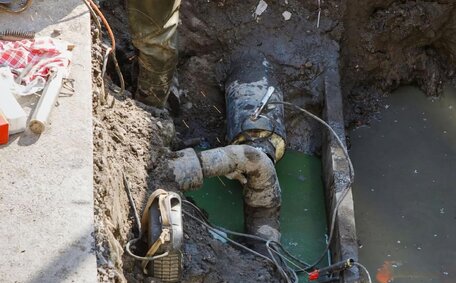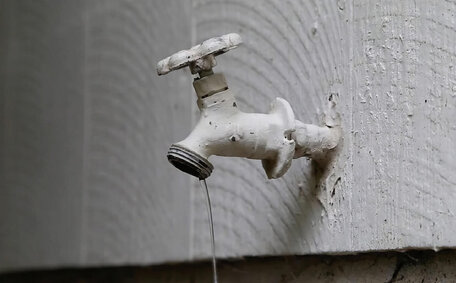Introduction to Soil Sedimentation and Drain Blockages
Soil sedimentation is a common issue that can lead to blocked drains and plumbing problems, especially after heavy rains. Sediment refers to the buildup of fine sediment, including sand, dirt, and debris, that gets washed into drainage systems. At Quakers Hill Plumbing, we often deal with blocked drains that have soil sediment as a contributing factor.
Over time, this sediment accumulates and causes water flow blockages.
During storms and flooding, water runoff can pick up and transport large volumes of sediment. Construction sites are especially problematic due to bare earth being more susceptible to erosion and runoff issues. During storms and flooding, water runoff can pick up and transport large volumes of sediment. Gradually, drainage capacity becomes hindered, and the risk of flooding incidents increases.
For homeowners and businesses in Quakers Hill and the surrounding Sydney area, sediment blockages present numerous headaches. Overflows of dirt, mud, and debris are also environmentally hazardous as the sediment pollution gets washed into waterways.
Backed-up sinks, showers not draining properly, gurgling toilet bowls, bad sewage odours, and flooding problems are all common symptoms of excessive sediment in drains.
The good news is that with proper mitigation strategies, sediment blockages can be prevented. At Quakers Hill Plumbing, we offer specialised drain cleaning and maintenance to clear out built-up sediment and organic matter. We also provide expert advice on erosion control techniques, drainage system solutions, and ways to safeguard your plumbing against future blockages.
Rely on our licenced tradesmen to keep your drains sediment-free.
How Soil Erosion Leads to Sediment Buildup in Drains
Soil erosion occurs when soil particles are dislodged and transported away by wind, water, or other forces. In the Quakers Hill area, heavy rainfalls are the main driver of soil erosion. Intense storms cause excessive surface runoff that result in sediment from bare ground being washed away into drainage systems.
Construction sites are hotspots for soil erosion problems due to the clearing of topsoil and vegetation. Without protective ground cover, erosion sediment on construction sites gets easily picked up by stormwater flows. Nearby properties are also vulnerable to accumulating washed sediment that makes its way into street gutters and backyard drainage pits during storms.
Over time, all this excess sediment ends up accumulating inside drains. Gradually, household plumbing fixtures and appliances start exhibiting symptoms of drainage issues.
Stormwater pipes, sewer lines, Pit Drains (YMIs), and other subsurface drainage infrastructure become congested. Dirt, sand, and debris clump together, reducing the diameter and water flow capacity of drains.
Based on our experience servicing Quakers Hill properties, common signs of sediment buildup in drains include: gurgling sinks/bathtubs, foul sewer odours inside, water pooling around drains outside, leaking joints, tree root invasion in broken pipes, and flooding during rains. Without timely drain cleaning, these annoying problems tend to worsen.
In summary, uncontrolled soil erosion leads directly to sediment congestion and obstructed drainage systems across Quakers Hill. The resulting plumbing issues can cost homeowners and businesses lots of money in property damage. Contact Quakers Hill Plumbing to learn about sediment control solutions for your property.
Preventing Soil and Sediment Entry into Drainage Systems
There are several effective ways that homeowners and businesses in Quakers Hill can prevent soil and sediment from entering drainage systems and causing blockages:
Erosion Control Barriers
Installing erosion control barriers is one of the most important proactive steps to take. These temporary sediment barriers intercept and filter out soil particles from stormwater runoff before they reach drains. Different options to protect your stormwater system include:
- Silt fencing - Made of geotextile fabric staked around sites to contain sediment.
- Sandbags - Stacked around storm drain inlets to block sediment flow.
- Gravel bags - More rigid than sandbags for protecting slopes and channels.
- Storm drain covers - Solid lids secured over drain openings to prevent sediment entry.
Protecting Vulnerable Areas
Care should be taken to stabilise vulnerable areas on properties through vegetation and ground coverings. Steep uncovered slopes and soil piles are prime sources of erosion. Solutions include:
- Hydroseeding - Fast-growing grasses sprayed over bare ground.
- Turf laying - Instant erosion protection from rolled grass coverings.
- Mulch - Bark chips or gravel spread atop bare soil.
Drainage System Maintenance
Regular maintenance helps keep drainage systems debris-free and flowing properly. Important practises involve:
- Routing gutters and downspouts away from sediment sources.
- Yearly drain inspections and preventive pipe cleaning.
- Applying root killer to remove invasive tree roots.
- Fixing broken drains, pipes, and catch pits allowing soil/sediment entry.
Following these simple soil erosion and sediment control guidelines will help minimise plumbing disasters. Contact Quakers Hill Plumbing to learn about customised drainage protection services for your property.
Using Silt Bags to Trap Sediment and Protect Drains
Silt bags offer an effective solution for trapping sediment and protecting drains in Quakers Hill. As removable sediment control devices, silt bags are easy to install around storm drain inlets or openings to underground drainage systems.
Silt bags consist of a durable geotextile outer bag filled with a filtration medium such as gravel, sand, or mulch. Stormwater flows through the permeable bag, filtering out soil particles and allowing only clean water to pass into the drain or pipe system.
During heavy rain events, silt bags can also prevent sediment-laden runoff from entering drains. Water quality is improved as the bag captures dirt, clay, and debris, reducing stormwater turbidity. Over time, the trapped sediment accumulates inside the bag which can be emptied and reused multiple times.
For properties in erosion-prone areas, placing silt bags around vulnerable drains mitigates sediment buildup underground. Drainage capacity and water flow is maintained, reducing chances of blockages. This protects plumbing fixtures from flooding, backflows, and damage during storms.
Regularly inspecting and maintaining silt bags also benefits local waterways. Preventing sediment escape into storm drains stops pollution discharge so that waterways can preserve their ecological integrity. This sustains healthy aquatic ecosystems within Quakers Hill.
Overall, silt bags provide a simple sediment control solution for homeowners and businesses seeking to reduce erosion impacts on their drainage systems. Contact the specialists at Quakers Hill Plumbing to learn how silt bags can help better protect your drains.
Installing French Drains to Improve Water Flow and Reduce Flood Risk
French drains can be an effective solution for properties in Quakers Hill that experience drainage issues due to excessive sediment or waterlogging after storms. A French drain is a trench filled with gravel where water can be redirected away from foundations.
As soil sedimentation accumulates and blocks subsurface pipes, French drains provide an alternate route for water to flow. This relieves pressure on the clogged drainage system and reduces the risk of flooding damage when rains are heavy.
French drains work by intercepting water and allowing it to quickly percolate through the loose gravel fill. Perforated pipes at the base of the trench speeds up water dispersal into surrounding soil. Strategic placement around retaining walls, crawl spaces, or waterlogged yards helps modulate drainage.
However, French drains require expert design and installation to function optimally. As licenced plumbers servicing Quakers Hill, we recommend constructing French drains with a slight slope for gravitational pull. The gravel fill also needs proper sifting to permit sufficient water flow. As licenced plumbers servicing Quakers Hill, we recommend constructing French drains with a slight slope for gravitational pull.
By engaging Quakers Hill Plumbing to install French drains, residents and businesses can protect their properties against flood damage as soil sedimentation rises across the region. Contact our team to evaluate if a custom French drain solution is right for your waterlogging issues.
Recognizing the Signs of Sediment-Related Drain Blockages
There are several clear signs that sediment buildup is causing drain blockages:
Slow or Backed up Drainage
Excess sediment accumulation in drain pipes restricts water flow. You may notice sinks, showers, and toilets draining slower than usual after use. Stagnant water pools around drain openings or takes longer to disperse after rains.
Gurgling Noises
Sediment obstructions often produce loud gurgling sounds as water attempts to squeeze through the congested drain. Bubbling or drainage gurgles tend to occur whenever a tap or appliance discharges water.
Sewage Odours
When drains get blocked with silt or debris, sewer gases can back up and escape into living spaces. Foul rotten egg smells inside bathrooms or near external drainage vents indicate an internal blockage.
Pipe Leaks & Wet Spots
Excess water pressure from clogged drains can cause underground pipe joints to leak. Visible water spots or damp earth near drain lines may signify sediment-related obstructions. If ignored, major pipe bursts can occur.
Catching sediment blockages early using these warning signs reduces flood damage risk from backups and overflows. Contact Quakers Hill Plumbing for professional drain assessments and cleaning.
Professional Drain Cleaning Services for Sediment Removal
When sediment accumulation leads to blocked drains, professional cleaning services are essential for clearing out the obstructions and restoring proper water flow. At Quakers Hill Plumbing, we have extensive experience tackling sediment-related clogs in residential and commercial plumbing systems.
High-Power Water Jetting
Our licenced plumbers utilise state-of-the-art water jet drain cleaning equipment generating up to 5000 PSI of hydro-jetting pressure. The intense water bursts can scour and disintegrate thick sediment, mud, and debris deposits that accumulate inside the drain pipe.
Snaking Tools & Manual Rodding
We also carry an arsenal of flexible drain snakes and metal rodding tools to manually agitate and extract stuck-on sediment. These methods work exceptionally well for small diameter pipes where pressurised jetting is unfeasible.
Environmentally Safe Drain Cleaners
Where necessary, we apply industrial-grade drain cleaning solutions to dissolve and loosen excessive sediment. Only environmentally gentle, PH-neutral formulas are used to prevent corrosion damage to pipes.
Sediment Filtration & Containment
We also utilise sediment bags and filtration socks on drains to capture dislodged particles during pipe cleaning. This prevents the contaminated sediment from spreading into waterways or landscaping.
In cases of extreme sediment compaction, extraction of the entire drain line followed by complete rehabilitation may be necessary. Trust our sediment control expertise for the right solutions to rectify your drainage.






